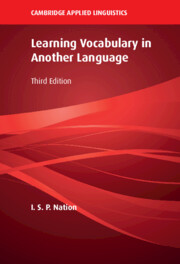Book contents
- Learning Vocabulary in Another Language
- The Cambridge Applied Linguistics Series
- Learning Vocabulary in Another Language
- Copyright page
- Contents
- List of figures
- List of tables
- Acknowledgements
- Introduction
- 1 The goals of vocabulary learning
- 2 Knowing a word
- 3 Teaching vocabulary and the roles of the teacher
- 4 Vocabulary and listening and speaking
- 5 Vocabulary and reading and writing
- 6 Learning vocabulary out of class
- 7 Vocabulary in specialised areas
- 8 Vocabulary-learning strategies and autonomy
- 9 Learning words from context
- 10 Word parts
- 11 Deliberate vocabulary learning from word cards
- 12 Finding and learning multiword units
- 13 Testing vocabulary knowledge and use
- 14 Designing the vocabulary component of a language course
- Book part
- References
- Author index
- Subject index
11 - Deliberate vocabulary learning from word cards
Published online by Cambridge University Press: 02 June 2022
- Learning Vocabulary in Another Language
- The Cambridge Applied Linguistics Series
- Learning Vocabulary in Another Language
- Copyright page
- Contents
- List of figures
- List of tables
- Acknowledgements
- Introduction
- 1 The goals of vocabulary learning
- 2 Knowing a word
- 3 Teaching vocabulary and the roles of the teacher
- 4 Vocabulary and listening and speaking
- 5 Vocabulary and reading and writing
- 6 Learning vocabulary out of class
- 7 Vocabulary in specialised areas
- 8 Vocabulary-learning strategies and autonomy
- 9 Learning words from context
- 10 Word parts
- 11 Deliberate vocabulary learning from word cards
- 12 Finding and learning multiword units
- 13 Testing vocabulary knowledge and use
- 14 Designing the vocabulary component of a language course
- Book part
- References
- Author index
- Subject index
Summary
The main idea behind this chapter is that the research on deliberately learning vocabulary shows that it is such an efficient and effective way of learning that, in terms of speed of vocabulary growth, a course that includes both incidental learning from communication-focused activities and deliberate learning will be much better than a course that relies only on incidental learning. Moreover, flash-card learning should be done so that the vocabulary worked on is repeatedly met until it is thoroughly learned. This goal of a high level of knowledge contrasts with the uncertain learning that occurs through other activities. Deliberately learning vocabulary before it is met in communication-focused activities means that the difficulty of such activities is reduced. Deliberately learning vocabulary after it has been met in a communication-focused activity means that the deliberate learning will be more meaningful and motivated. This chapter describes a list of well-supported guidelines for learning using flash cards. These principles should also be used in electronic flash-card programs.
Keywords
- Type
- Chapter
- Information
- Learning Vocabulary in Another Language , pp. 397 - 432Publisher: Cambridge University PressPrint publication year: 2022

